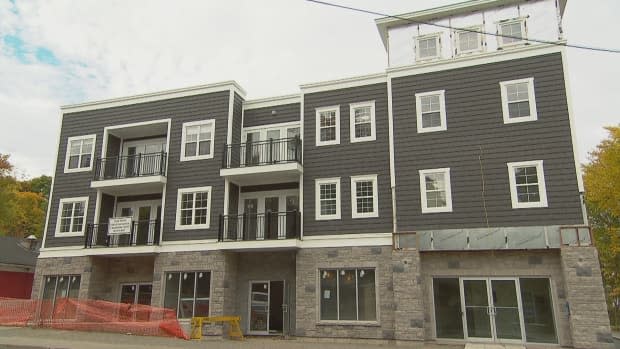Homelessness touches every corner of N.S., and the numbers prove it

After living in a hotel for more than a month, Lisa Dewitt's bank account is close to empty, she has no prospects for a permanent place to live and it's almost check-out time.
The 52-year-old had to leave her apartment in downtown New Glasgow, N.S., in September after part of the building caught fire. Her unit didn't go up in flames, but she was told the entire building had been rendered unsafe for living.
"Right then and there I thought, 'I'm in trouble,'" she said.
The trouble, she knew, would be in finding a new home. For the nine months leading up to the fire, Dewitt was on a month-to-month lease and was looking for a new apartment, to no avail.
Her struggle to find affordable housing is not unique. Data compiled by CBC from community organizations in every region of the province clearly indicates homelessness is a problem that stretches from Yarmouth in the southwest to Sydney in Cape Breton, and everywhere in between.
The latest available numbers show 1,168 people recently sought help because they're homeless or on the verge of losing their home. Rural Cape Breton is the only area for which no data could be found.

Dewitt doesn't consider herself to be homeless, yet, but she fits most definitions, along with anyone else living in a hotel or car, crashing on couches or sleeping outside.
Community organizations try to keep track of the number of people experiencing homelessness, and the provincial government relies on those estimates to inform its response in terms of policy and services provided.
The people collecting that data generally believe their counts underestimate the actual scope of the problem. That's in part because of cases such as Dewitt's. She has been hesitant to reach out for help because she doesn't think she would qualify.
The latest count out of Halifax is 416. That number is updated and posted online weekly by the Affordable Housing Association of Nova Scotia, and is an aggregation of information from organizations across the municipality.
The system the association uses is something of a gold standard, and several organizations in other regions are working to develop their own.
For now, outside of the Halifax region, numbers are not collected regularly or in a consistent way, making it difficult to make direct comparisons between regions. Some of the figures provided to CBC are as much as a year old, others just days old. Some are from surveys involving multiple community organizations, while others are from individual housing support workers.

On a single day in April, 119 people were counted as homeless in Cape Breton Regional Municipality. Over the course of one month last fall, 226 people across Hants, Kings and Annapolis counties were counted.
Similar month-long counts were completed in Cumberland and Colchester counties this spring, yielding a combined total of 100.
Since the start of the year, 171 people have sought housing help from a single organization in Lunenburg and Queens counties.
As of last week, 30 people in Shelburne, Yarmouth and Digby counties were on a list of people experiencing homelessness.
For Pictou County, CBC relied on the caseload of the county's only housing support worker. Over the past six months, that worker has had 55 clients.
Just up the highway, the situation is similar. The one housing support worker serving both Antigonish and Guysborough counties had, as of last week, 51 clients.
That worker is Anita Stewart, with the non-profit A Roof Over Your Head. Stewart said she knows of at least 10 more people in the town of Antigonish who would qualify for her help, but they haven't asked for it, so they aren't officially counted.

'Feeling very defeated'
Stewart said she often gets shocked responses from people in her community when she shares those numbers. There are no tent encampments in Nova Scotia's small towns, as there are in Halifax; homelessness is more often out of view.
"I'm just feeling very defeated," said Stewart. "We have 51 people that we cannot house because we do not have the housing."
Antigonish has several apartment buildings that are either under construction or were recently completed, but none fit the budget of Stewart's clients. She said the buildings' developers have told her they'll be looking for $1,500 and up per unit, per month. Most of Stewart's clients can afford to pay about $700.

"The immediate short-term solution is that we need emergency housing facilities. We need to get people out of the cold," she said. "Long-term, our ask is to erect more affordable-housing units."
Stewart brought those solutions to a recent meeting she convened with politicians who represent her clients at the municipal, provincial and federal governments. She said she was satisfied that they understood how urgent the need is, and expects to meet with them all again this fall.
The provincial government is expected to release a plan for addressing the housing crisis this week.
In the meantime, Dewitt continues to search for a new apartment with decreasing morale.
"There's hundreds of people applying for one apartment. I'm just a number. By the time I usually get to it, it's gone, or no pets allowed, so I don't even get the option to apply."
Her experience is reflective of the findings of a report on housing in Pictou County, commissioned by the Pictou County Housing Coalition and released in August.
The report's author notes the rental vacancy rate for New Glasgow was 2.4 per cent in 2020.
"We can expect that the rental vacancy rate has only worsened since 2020, as it is now nearly impossible to find rental housing in Pictou County," the report said.
Next step: living in her car
When the evacuation order came following the apartment fire, Dewitt packed a few possessions and her two small dogs, and moved into a nearby hotel.
Parts of Dewitt's six-week hotel stay have been paid for — two nights by the Canadian Red Cross, a week by a family friend and 18 days by the Tearmann Society, which helped Dewitt leave an abusive relationship several years ago.
At $100 a night, she's nearly depleted her savings to pay for the rest of the stay. When she spoke to CBC last week, she was preparing to move into her car by week's end. Another family friend stepped in at the last minute to move her into a different hotel for one week.

Dewitt said she was proud to be financially independent before losing her apartment. As a continuing-care assistant, her work is in high demand at long-term care facilities and she said shifts are always on offer.
Now she finds herself unable to work. She said on occasions when she's left her hotel room for more than a few minutes, her dogs' barking has prompted hotel staff to call and ask her to return to quiet them down.
She said if she wasn't concerned about being kicked out of the hotel, she could be working full time, as she did prior to the apartment fire. In the past six weeks she has depleted her savings paying for portions of her hotel stay, along with other living expenses.
Dewitt said she's been advised by friends and colleagues to leave New Glasgow for a community with more favourable conditions for renters. She said she doubts such a place exists in Nova Scotia.
MORE TOP STORIES


